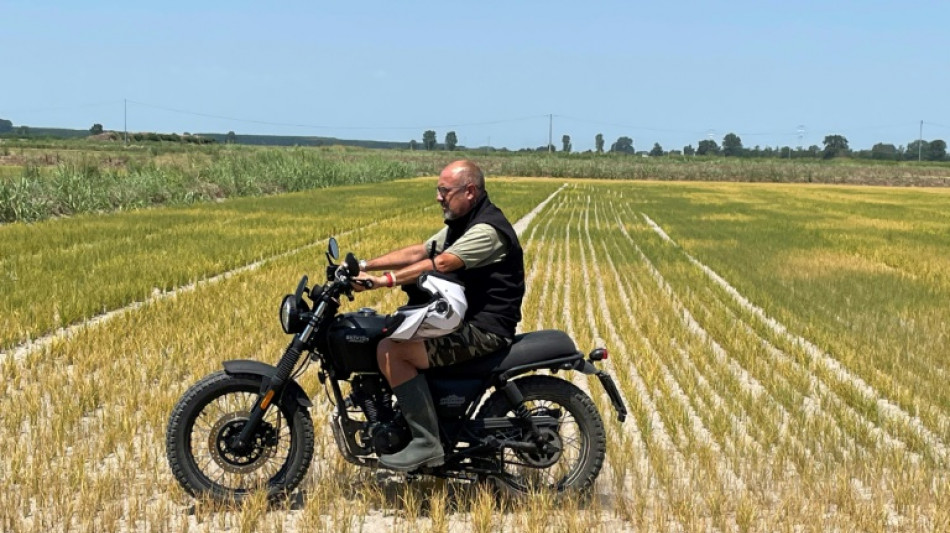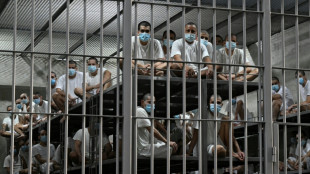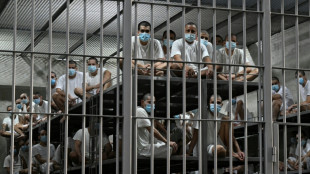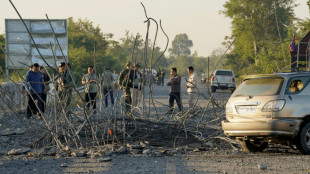
-
 Australian state pushes tough gun laws, 'terror symbols' ban after shooting
Australian state pushes tough gun laws, 'terror symbols' ban after shooting
-
A night out on the town during Nigeria's 'Detty December'

-
 US in 'pursuit' of third oil tanker in Caribbean: official
US in 'pursuit' of third oil tanker in Caribbean: official
-
CO2 soon to be buried under North Sea oil platform

-
 Steelers edge Lions as Bears, 49ers reach playoffs
Steelers edge Lions as Bears, 49ers reach playoffs
-
India's Bollywood counts costs as star fees squeeze profits

-
 McCullum admits errors in Ashes preparations as England look to salvage pride
McCullum admits errors in Ashes preparations as England look to salvage pride
-
Pets, pedis and peppermints: When the diva is a donkey

-
 'A den of bandits': Rwanda closes thousands of evangelical churches
'A den of bandits': Rwanda closes thousands of evangelical churches
-
Southeast Asia bloc meets to press Thailand, Cambodia on truce

-
 As US battles China on AI, some companies choose Chinese
As US battles China on AI, some companies choose Chinese
-
AI resurrections of dead celebrities amuse and rankle

-
 Steelers receiver Metcalf strikes Lions fan
Steelers receiver Metcalf strikes Lions fan
-
Morocco coach 'taking no risks' with Hakimi fitness

-
 Gang members given hundreds-years-long sentences in El Salvador
Gang members given hundreds-years-long sentences in El Salvador
-
Chargers, Bills edge closer to playoff berths

-
 Gang members given hundred-years-long sentences in El Salvador
Gang members given hundred-years-long sentences in El Salvador
-
Hosts Morocco off to winning start at Africa Cup of Nations

-
 No jacket required for Emery as Villa dream of title glory
No jacket required for Emery as Villa dream of title glory
-
Amorim fears United captain Fernandes will be out 'a while'

-
 Nigerian government frees 130 kidnapped Catholic schoolchildren
Nigerian government frees 130 kidnapped Catholic schoolchildren
-
Captain Kane helps undermanned Bayern go nine clear in Bundesliga

-
 Captain Kane helps undermanned Bayern go nine clear
Captain Kane helps undermanned Bayern go nine clear
-
Rogers stars as Villa beat Man Utd to boost title bid

-
 Barca strengthen Liga lead at Villarreal, Atletico go third
Barca strengthen Liga lead at Villarreal, Atletico go third
-
Third 'Avatar' film soars to top in N. American box office debut

-
 Third day of Ukraine settlement talks to begin in Miami
Third day of Ukraine settlement talks to begin in Miami
-
Barcelona's Raphinha, Yamal strike in Villarreal win

-
 Macron, on UAE visit, announces new French aircraft carrier
Macron, on UAE visit, announces new French aircraft carrier
-
Barca's Raphinha, Yamal strike in Villarreal win

-
 Gunmen kill 9, wound 10 in South Africa bar attack
Gunmen kill 9, wound 10 in South Africa bar attack
-
Allegations of new cover-up over Epstein files

-
 Atletico go third with comfortable win at Girona
Atletico go third with comfortable win at Girona
-
Schwarz breaks World Cup duck with Alta Badia giant slalom victory

-
 Salah unaffected by Liverpool turmoil ahead of AFCON opener - Egypt coach
Salah unaffected by Liverpool turmoil ahead of AFCON opener - Egypt coach
-
Goggia eases her pain with World Cup super-G win as Vonn takes third

-
 Goggia wins World Cup super-G as Vonn takes third
Goggia wins World Cup super-G as Vonn takes third
-
Cambodia says Thai border clashes displace over half a million

-
 Kremlin denies three-way US-Ukraine-Russia talks in preparation
Kremlin denies three-way US-Ukraine-Russia talks in preparation
-
Williamson says 'series by series' call on New Zealand Test future

-
 Taiwan police rule out 'terrorism' in metro stabbing
Taiwan police rule out 'terrorism' in metro stabbing
-
Australia falls silent, lights candles for Bondi Beach shooting victims

-
 DR Congo's amputees bear scars of years of conflict
DR Congo's amputees bear scars of years of conflict
-
Venison butts beef off menus at UK venues

-
 Cummins, Lyon doubts for Melbourne after 'hugely satsfying' Ashes
Cummins, Lyon doubts for Melbourne after 'hugely satsfying' Ashes
-
'It sucks': Stokes vows England will bounce back after losing Ashes

-
 Australia probes security services after Bondi Beach attack
Australia probes security services after Bondi Beach attack
-
West Indies need 462 to win after Conway's historic century

-
 Thai border clashes displace over half a million in Cambodia
Thai border clashes displace over half a million in Cambodia
-
Australia beat England by 82 runs to win third Test and retain Ashes


EU's next food fight: regulating gene-edited crops
Extreme weather caused by climate change has damaged food production across Europe.
Confronted with a deteriorating situation, divided European Union decision-makers are debating new rules for genetically modified crops.
Last year's drought ravaged the continent's farms, starving everything from Spanish olive harvests to Hungary's maize and sunflower crops, Italian and Romanian corn fields to France's dairy production.
Some argue the answer to Europe's problems is deregulating gene modification techniques to produce better crops. Others claim this would be a "smokescreen" to avoid having to radically change the way the bloc farms.
Supporters say seeds produced using gene editing techniques are less vulnerable to drought and disease -- and require less water.
The European Commission, the EU's executive arm, will propose a law in July that will loosen the rules on plants produced by certain new genomic techniques (NGTs), branded by critics as simply "new genetically modified organisms (GMOs)".
The proposals will open a new battlefront among the EU's 27 member states -- with drought-hit countries especially in favour -- and between EU lawmakers.
The new techniques are a mix of genomic editing tools that alter a plant's genetic make-up without the addition of foreign genetic material, unlike "transgenic" GMOs that include DNA from other species.
The commission says the current rules on GMOs including permission and labelling are "not fit for purpose" for the new technology.
"Plants produced by new genomic techniques can support sustainability," the EU's health commissioner, Stella Kyriakides, said last month.
The proposals, she said, "will strongly signal to farmers, researchers and industry that this is the way forward in the EU".
- 'Magnificent tool' -
In a document from February seen by AFP, the commission looked at whether it should treat traditional seeds and those produced using the new techniques, with modifications that could in theory have happened naturally, as the same.
France, severely affected by drought last summer, backs changing the rules.
In April, French Agriculture Minister Marc Fesneau expressed his concerns over what he called Europe's "delay", arguing there should be a push to allow biotechnology that gives Europe the tools to deal with climate change by producing more resistant seeds.
Late last year, his Spanish counterpart, Luis Planas, hailed the techniques as a "magnificent tool to have seeds that need less water and fertiliser".
Other countries are more wary.
In March, Austria criticised a commission study that it claimed was based on "assumptions" rather than scientific data and called for a comprehensive analysis of any environmental and health risks.
Cyprus, Germany, Hungary and Luxembourg support that position.
The powerful European farming lobby group Copa-Cogeca supports the new rules.
"If we need to supply society with food in Europe, and if we want to be self-sufficient, then we need to adapt rules," said Thor Gunnar Kofoed, chair of the seed working group at Copa-Cogeca.
- Parliament divided -
A majority of EU lawmakers support relaxing the rules.
The European Parliament's biggest political group, the conservative European People's Party (EPP), opposes any binding target to cut pesticides but pushes for new rules on the "innovative" technology that would "stimulate research, investment and jobs".
Pascal Canfin, a French centrist MEP and the chairman of the parliament's environment committee, said the new biotechnology could "be part of the useful solutions for the agricultural transition" if they help avoid using chemical pesticides.
But unlike the EPP, he supports a cap on pesticides.
Left-wing parties in the EU parliament are resisting specific laws for NGTs, insisting that the new technology already comes under current wide-ranging rules on GMOs.
The forthcoming battle over the draft law, which will have to be negotiated between the member states and parliament, is likely to focus on safeguards.
The Greens want a full risk assessment to avoid unintended effects and force producers to ensure detection and traceability methods, and make labelling compulsory.
Labelling would put off consumers who prefer GMO-free food, said Mute Schimpf, a campaigner for Friends of the Earth Europe, who criticised the reform.
"This proposal is a smokescreen to avoid the debate we should have on shifting to a truly sustainable farming system," she told AFP.
P.Martin--AMWN



